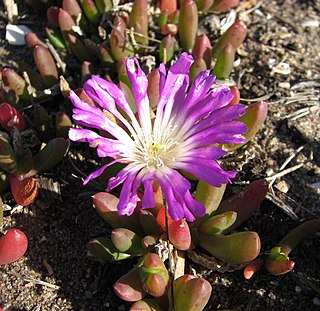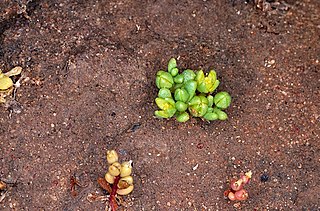
Eremophila oppositifolia, commonly known as weeooka, twin-leaf emu bush and mountain sandalwood, is a plant in the figwort family, Scrophulariaceae, and is endemic to Australia. It is a shrub or small tree with its leaves arranged in opposite pairs and has cream to red or sometimes maroon coloured flowers. It occurs in all mainland states, but not the Northern Territory.

Disphyma is a genus of flowering plants in the family Aizoaceae that are native to New Zealand, Australia and southern Africa. Plants in this genus are prostrate, annual or short-lived perennial shrubs with succulent leaves and daisy-like flowers arranged singly on the ends of shoots with petal-like staminodes, many stamens and usually five styles.
Disphyma crassifolium, commonly known as round-leaved pigface, is a species of flowering plant in the family Aizoaceae and is native to the Australia and the Cape Provinces of South Africa. It is a prostrate, succulent annual shrub or short-lived Perennial plant with stems up to 2 m long, leaves that are three-sided in cross-section with a rounded lower angle, and purple daisy-like flowers with staminodes up to 30 mm (1.2 in) long.

Disphyma crassifolium subsp. clavellatum is the subspecies of Disphyma crassifolium that occurs in Australia and New Zealand. It is sometimes known by the common name rounded noon-flower
Diocirea is a genus of flowering plants in the figwort family, Scrophulariaceae. The genus is endemic to a small area in the south-west of Western Australia and is intermediate in character between Eremophila and Myoporum. There are four members of the genus, all of which are small shrubs with stems and leaves which produce a resin making the plants appear bluish-green. Neither the genus, nor any of the species had been described before 2007 although a few specimens had been collected as Eremophila elachantha. Despite their limited distribution, they often occur in populations of several thousand individual plants, forming a dense ground cover.
Disphyma australe is a species of flowering plant in the family Aizoaceae and is endemic to New Zealand. It is a prostrate, succulent annual shrub or short-lived perennial plant with stems up to 2 m long, leaves that are three-sided in cross-section with a rounded lower angle, and white to deep pink daisy-like flowers with staminodes up to 30 mm (1.2 in) long.

Gunniopsis is a genus of flowering plants in the iceplant family, Aizoaceae. These plants are found in areas of inland Australia.

Gunniopsis intermedia, commonly known as yellow salt star, is a succulent plant in the iceplant family, Aizoaceae. It is endemic to Australia.
Gunniopsis quadrifida, the Sturts pigface, is a plant endemic to Australia that is within the family Aizoaceae. This family consists of a diverse array of species that inhabit arid and/or saline coastal and inland areas, with the plants displaying leaf morphology that is conducive to such harsh environments. Typical features of members of this genus that lie within this family of succulents includes the presence of fleshy-leaves that acts as a water reservoir for the plant with the habit of a smalls shrub.
Gunniopsis calcarea, commonly known as the Nullarbor Gunniopsis or the yellow flowered pigface, is a succulent plant in the iceplant family, Aizoaceae. It is endemic to Australia.
Gunniopsis zygophylloides, commonly known as the twin-leaf pigface, is a succulent plant in the iceplant family, Aizoaceae. It is endemic to Australia.
Gunniopsis divisa is a succulent plant in the iceplant family, Aizoaceae. It is endemic to Western Australia.
Gunniopsis calva, commonly known as the smooth pigface, is a succulent plant in the iceplant family, Aizoaceae. It is endemic to Australia.
Gunniopsis propinqua is a succulent plant in the iceplant family, Aizoaceae. It is endemic to Western Australia.

Gunniopsis septifraga, commonly known as green pigface, is a species of flowering plant in the iceplant family, Aizoaceae and is endemic to Australia. It is a prostrate to tuft-forming annual herb, with oblong to lance-shaped leaves and small greenish flowers, that grows around salt lakes.
Gunniopsis glabra is a succulent plant in the iceplant family, Aizoaceae. It is endemic to Western Australia.
Gunniopsis rodwayi is a succulent plant in the iceplant family, Aizoaceae. It is endemic to Western Australia.
Gunniopsis tenuifolia, commonly known as the narrow-leaf pigface, is a succulent plant in the iceplant family, Aizoaceae. It is endemic to Australia.

Gunniopsis papillata, commonly known as the twin-leaved pigface, is a species of succulent plant in the iceplant family, Aizoaceae and is endemic to inland areas of Australia. It is an annual herb with pimply, spatula-shaped to egg-shaped leaves and flowers with white or yellow petals.
Gunniopsis kochii, commonly known as the Koch's pigface, is a succulent plant in the iceplant family, Aizoaceae. It is endemic to Australia.




